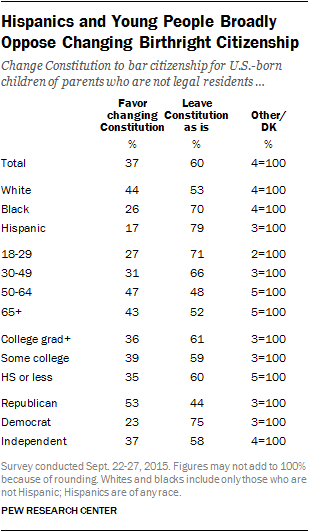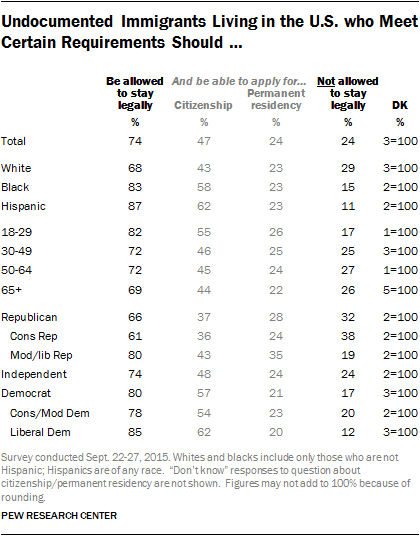Survey Report
As immigration emerges as a key issue in the presidential campaign, there is little common ground between Republicans and Democrats in views of several immigration policy proposals. But partisan disagreements are much more pronounced on some issues than others.

Overall, the public continues to be divided over building a fence along the entire U.S.-Mexican border: 46% favor erecting a fence, while 48% are opposed, little changed from 2011.
A large majority of Republicans (73%) support a border fence, while 23% are opposed. Democrats oppose building a border fence, 66% to 23%. Among independents, 43% favor a border fence, while 52% oppose this idea.
The latest national survey by the Pew Research Center, conducted Sept. 22-27 among 1,502 adults, finds that most Americans (60%) oppose the idea of changing the U.S. Constitution to prohibit children of those who are not legal residents from becoming citizens; 37% favor changing the Constitution to end “birthright citizenship.”
Again, Republicans and Democrats are far apart on this issue: By 75% to 23%, Democrats oppose changing the Constitution to ban birthright citizenship. Republicans are evenly divided: About half (53%) favor amending the Constitution, while 44% are opposed.
By contrast, large majorities in both parties continue to favor a way for allowing undocumented immigrants to stay in the U.S. legally, if certain requirements are met. About two-thirds of Republicans (66%) say people in the U.S. illegally should be allowed to stay if they meet certain requirements, while 32% say they should not be allowed to stay legally. By nearly a factor of five-to-one (80% to 17%), Democrats say undocumented immigrants should be allowed to stay in the U.S. legally, provided certain requirements are met.
Little Overall Change Since 2007 in Views of a Border Fence

Public opinion about building a fence along the entire U.S.-Mexican border has shown virtually no change since 2007 or 2o11. But age and partisan differences in opinions about a proposed border fence have widened, with Republicans becoming more supportive and Democrats less so over the past four years.
Nearly three-quarters of Republicans (73%) now favor building a fence across the entire border with Mexico, up from 62% in 2011. Since then, support for a fence has increased 17 percentage points among moderate and liberal Republicans (from 54% to 71%) and eight points among conservative Republicans (66% then, 74% now).
Over the same period, the share of Democrats who favor building a border fence has declined 10 points (from 39% to 29%). Independents’ views (43% favor) are unchanged since 2011 (44%) or 2007 (43%).
Today, adults 50 and older are 18 points more likely than those under 30 to favor building a fence across the entire border (52% vs. 34%). In 2011, there was a seven-point difference in support for building a fence (48% of those 50 and older vs. 41% of those younger than 30). In 2007, identical percentages of older and younger people favored building a fence.
Most Favor Continued Birthright Citizenship


There is broad awareness of birthright citizenship for children born to illegal immigrants in the United States: 90% say they are aware that these children are automatically citizens. About four-in-ten (37%) favor changing the Constitution so that parents must be legal residents of the U.S. in order for their newborn children to be citizens; 60% favor leaving the Constitution as it is.
Large majorities of those under 30 (71%) and those ages 30-49 (66%) oppose limiting birthright citizenship. Older age groups are more divided: Among those ages 50-64 as many favor (47%) as oppose (48%) this change to the Constitution. Among those 65 and older, 43% favor changing the Constitution, while 52% are opposed.
Whites are far more supportive (44% favor) of changing the Constitution to end birthright citizenship than are blacks (26%) or Hispanics (17%). There are only slight differences in opinions among those of differing levels of education.
Opinions about birthright citizenship have changed only modestly among most sub-groups since the Pew Research Center began asking the question in 2006. But partisan differences have widened over the last four years: In 2011, 47% of Republicans and 32% of Democrats favored changing the Constitution to end birthright citizenship. Today, the gap is 30 percentage points (53% of Republicans, 23% of Democrats).
Broad Support for Providing Legal Status to Undocumented Immigrants

The public’s views on how to handle undocumented immigrants in the U.S. has changed little since May. Currently, 74% say there should be a way for them to stay in the country legally, if certain requirements are met. About a quarter (24%) say undocumented immigrants should not be allowed to stay in the U.S. legally.
Most of those who favor providing legal status to people living in the U.S. illegally say they should be allowed to apply for U.S. citizenship (47% of the public), while 24% say they should be able to apply for permanent residency, but not citizenship.

As in the past, majorities across all demographic and partisan groups favor providing legal status to undocumented immigrants. Republicans (66%) continue to be less likely than independents (74%) or Democrats (80%) to support a path to legal status for those in the U.S. illegally.
However, Republican support for finding a way to allow undocumented immigrants to stay in the U.S. if they meet certain requirements has increased 10 percentage points since May, from 56% to 66%. There has been virtually no change in opinion among Democrats or independents.




